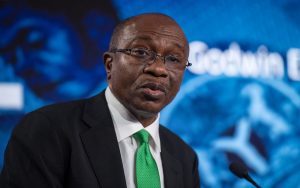Nigeria’s MPC disappoints analysts, investors, keeps policy rates constant
January 26, 2022705 views0 comments
The broad expectation of financial and economic analysts and experts that Nigeria’s central bank will tweak rates in its first meeting in the new year on the back of an upswing in inflation in December the Monetary Policy Committee, unsurprisingly on Tuesday left all monetary policy parameters unchanged for another time by unanimous vote at its just-concluded first meeting for the year held in Abuja.
The decision means the monetary policy rate (MPR) remains 11.5 percent, Cash Reserve Ratio (CRR) 27.50 percent, Liquidity Ratio (LR) 30 percent and the asymmetric corridor of +100/-700 basis points around the MPR.
Godwin Emefiele, governor of the Central Bank of Nigeria (CBN) announced the decision in Abuja where he noted that the decision follows the significant improvement in output growth and the need to continue monitoring the trends in inflation and improvement of credits to the real sectors of the economy.
According to the apex bank governor, “The MPC noted that a loosening stance will fuel inflationary pressures and it could trigger FX pressures and narrow other alternative investments sources for Nigeria. Tightening could truncate the improvement in credit to the private sector, credit soundness and that could counteract CBN’s motive towards the improvement of credit to the real sector, while a hold policy stance will help the bank monitor trends in inflation, output growth and credits to the private sector.
Read Also:
- Nigeria on track for economic growth resurgence in 2025, say analysts
- Bulls tighten grip by 0.99% in year-end window-dressing as investors gain N987bn
- NGX extends bullish run as investors pocket N609.27bn in holiday-shortened week
- Oil edges higher as investors eye post-holiday market trends, China…
- Turnover in fixed income market soars on high yields as investors inject…
“Building on the improved growth in Q3 and the pandemic, the nation’s output is expected to grow continuously in 2022. Thus, the committee expressed concerns about insecurity in the country and the rising consumer price index.
“Inflation was typical of the rising demand during the festivities. Nigeria is at the moment confronted by inflation and fragile output and is concerned that various measures were helping to accelerate growth and also moderate prices,” said Emefiele.
The MPC had left rates unchanged all through 2021 to support the economic recovery drive. Also, as some economic experts had noted, the MPC’s position on policy variables complement other policy actions such as high LDR (65.0%) to drive increased credit flows to the private sector, which rose 14.5 percent year on year to N34.5 trillion between January and October of 2021 and the modest GDP growth of 3.2 percent between Q1 and Q3 in 2021.
Notwithstanding, major factors that were considered by the CBN’s MPC included monetary policy tone and inflation pressure in Advanced Economies (AEs), crude oil price movement, COVID-19 variants threat, domestic inflation trend, growth in money supply and credit to the private sector, and strength of the foreign reserves.

